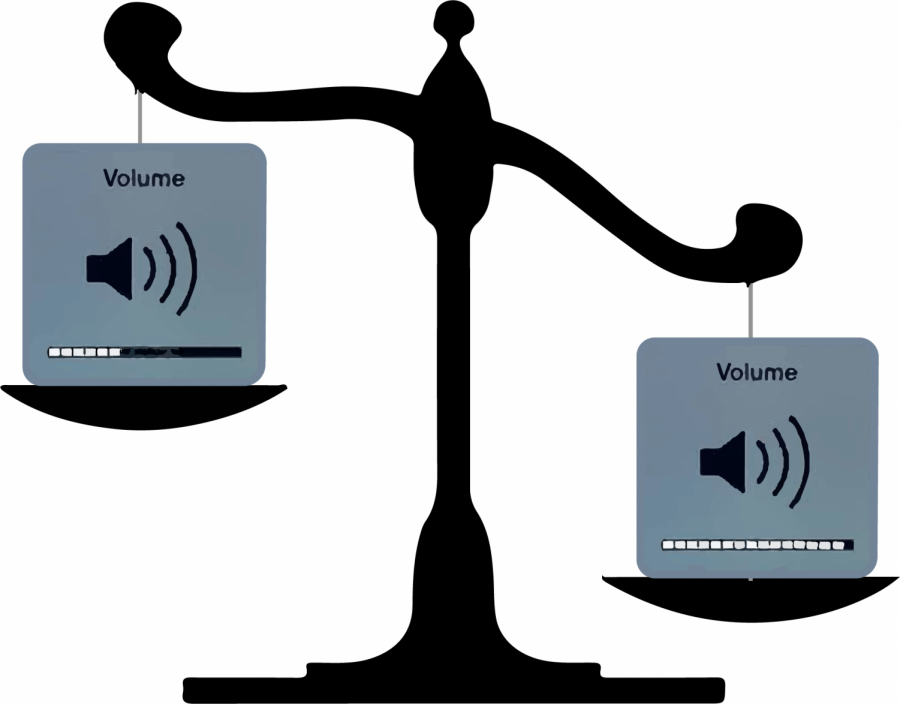Opinion- Power of Voice
Columnist reviews difficulties of speaking your mind in 2020
A louder volume image outweighs a soft volume image on a scale. In a visual representation of conversations, graphic designer Harvey Watkins shows how the louder voices in society hold more weight. “No doubt people who are afraid to share their views miss an important opportunity,” junior Kate Carline said. “A person has to be open to changing their view when presented new facts.”
December 18, 2020
Communication is the most important part of human interaction.
At the core of all discussions are opinions and facts, blending to create a dialogue.
In the midst of all of that are feelings.
Emotions tend to cloud the conversation’s true meaning, which is even more evident during the digital age. However, heated arguments aren’t the direct result of cellphones and social media.
“The younger generation is the least responsible for the switch in communication outside of a moderated setting,” debate coach and professional communications teacher Joshua Wurzman said. “People have argued about virtually everything for as long as communication has existed.”
While this communication error isn’t necessarily the younger generation’s fault, most modern conversations are started with biased facts.
“Today, we have people approaching issues with completely different sets of truths with no middle ground of agreement on the basic facts,” Wurzman said.
When conversations morph into arguments, there is a loss in genuine discussions, effectively silencing the opinions of those unwilling or unable to speak loud enough to defend themselves.
“The solution isn’t to stop interacting with opposing views,” junior and debate student Kate Carline said. “It’s to change the way we think about arguing. If we think of it as a productive conversation rather than an aggressive fight, we can get the benefits of contrasting views without the negativity.”
When one voice overshadows others in a conversation, opinions aren’t equally heard, and the voices of those that aren’t able to or can’t speak for themselves get lost in the noise. If one opinion over-powers the others, it becomes the image of the narrative.
“No doubt people who are afraid to share their views miss an important opportunity,” Carline said. “A person has to be open to changing their view when presented new facts.”
To keep conversations civil, topics mustn’t be lost in the throes of passion. There are people behind these voices, and attacking another person makes your own argument weaker. The one being verbally berated is then less likely to share their opinions in the future.
“I feel like since (COVID) there has been more backlash and arguments on personal topics and beliefs,” senior Nikki Hansen said. “But it’s those kinds of things that make us stronger because we’re actually talking about those things rather than just glossing over.”
Differences should be celebrated in conversation. A conversation is about learning about things that you do not know, discussing common opinions and learning about different beliefs, not ad-hominem attacks that insult those you talk to.
“Always try to keep in mind that just because one person doesn’t believe what you believe, doesn’t mean they’re wrong,” Hansen said. “It’s just what they believe, what they choose to believe.”
As the world goes into 2021, a year full of promise and hope (and hopefully no COVID), the year must also be approached with understanding. All people will not have the same opinion or view on a matter, and that doesn’t make that person wrong; it makes them different. So as the new year rolls over, make an effort in conversation to try to understand others rather than fight.
“Kindness is power,” Hansen said. “Encourage kindness because it’s a superpower; it comes back around.”









Keith
Dec 18, 2020 at 11:04 pm
I completely agree about how we handle debates and discussions. It makes the world a sad place sometimes.